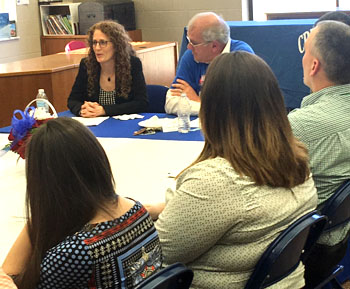Crestview educators testify in Columbus
Editor’s note: This is the second in a two-part series on local input on state education initiatives.
DAVE MOSIER/independent editor
Two Crestview educators were among those who testified last week before the Ohio General Assembly’s Joint Educational Oversight Committee. It was one of a couple initiatives by Crestview Local Schools to further communication with state officials, following an education roundtable held two weekends ago.
Trent Kreischer, director of curriculum and instruction at Crestview, and James Lautzenheiser, an eighth-grade history teacher, both testified on educational concerns in Columbus.
Kreischer, a classroom teacher for 16 years before taking his current position four years ago, spoke on the passage of he Every Student Succeeds Act (ESSA) in December 2015, and what he was told would be an opportunity for education in Ohio to get a “facelift.”

Unfortunately, Kreischer noted, some of the promise contained in ESSA has not occurred, with high-stakes testing and a State Report Card that is too confusing and changes too often still a part of the system. The Crestview curriculum director was especially disappointed in the State Report Card system, and said he feels a less labeling report card would create a “more collaborative landscape”, which he said was especially important for rural schools, which must maintain a system of shared services to survive in the face of decreased state funding.
“Reports should report, no harshly over evaluate and create confusion,” Kreischer said of the State Report Card system. “Community members and parents see only the grades, and do not understand the meaning.”
Kreischer also address state testing, noting that he agrees with the Ohio Department of Education’s draft plan that would “stabilize state-level assessments and avoid making new modifications for several years.”
However, the curriculum director said maintaining the current number of assessments and using them on teacher evaluations is not required under ESSA.
Kreischer talked about the education roundtable held February 18 that included State Senator Cliff Hite, State Representative Craig Riedel, and State School Board member Linda Haycock.
“Many of our parents and students expressed frustration over the burden that tests not only placed on them and their families, but also on teachers and school districts,” Kreischer said, adding that some students talked about the fact that teachers feel compelled to “teach to the test” because of the high-stakes nature of the tests.
Kreischer said ESSA allows the state to decrease the number of tests from 23 to 17, while also removing student growth measures from teacher evaluations.
“The overwhelming message from our community is to allow the provisions in ESSA to unburden our districts as much as possible by releasing the pressure valve,” he added. “They don’t want to have the State of Ohio supersede the federal law when it’s not necessary.
“Our community of parents, teachers, and leaders are expressing the need for a shift back to local control, and overwhelmingly feel that this plan is being fast-tracked without much change from the status quo,” Kreischer concluded. “Our best and brightest young people are already avoiding education as a career because of state initiatives like Resident Educator and the program’s required summative assessment.
The curriculum director also added that the Crestview community’s message is simple and clear:
“Let’s stop punishing districts who are meeting the community expectations of educating students responsibly by placing unnecessary burdensome initiatives on them,” Kreischer said. “A ‘one size fits all’ approach does not work; we strongly advocate a return to local control so that we may educate our children based on the values and beliefs that our parents hold so truly dear.”
Lautzenheiser noted that, while the ODE has held a number of listening sessions and webinars aimed at getting input from education stakeholders, the state’s education plan does not change significantly from previous ones, despite the input.
His main reason for testifying, Lautzenheiser said, was to address the issue of local control in the student testing process from an educator’s viewpoint.
“While most advocates of public education are comfortable using this buzz phrase in liberal fashion, our students are still taking a wave of standardized tests that constantly change in format or stressed set of skills from year to year,” the history teacher said.
Noting that Crestview undergoes a rigorous process of vetting educational plans, including expectations of student growth and well-being, Lautzenheiser said he feels local control is preferable to a top-down assessment process.
“I believe that our district and other public school districts have the capability to use this application of local control in other areas, including subject areas that are typically reserved for statewide standardized testing,” the Crestview teacher noted.
Lautzenheiser also talked about the education roundtable in February, noting that Senator Hite “inspired many in the room that afternoon to advocate on behalf of our students and community.
“If we truly believe that public educations are the real-life experts on public education, more trust needs to be given to those at the local level to handle assessments, evaluations, and responses for our children at the local level,” Lautzenheiser added.
The Crestview history teacher also said he feels that the General Assembly needs to demand that the Ohio Department of Education slow down the process for approving and implementing the current plan something that has happened with the recent announcement by State Superintendent of Instruction Paolo DeMaria that the ODE would delay its ESSA template submission until September to allow more feedback from Ohio education stakeholders.
To address one of the key concerns heard pertaining to reduction in testing, Superintendent DeMaria is also convening a Superintendent’s Advisory Committee on Assessments to focus on the full range of testing issues — including state-required tests, as well as district-level tests.
POSTED: 03/14/17 at 8:20 am. FILED UNDER: News







